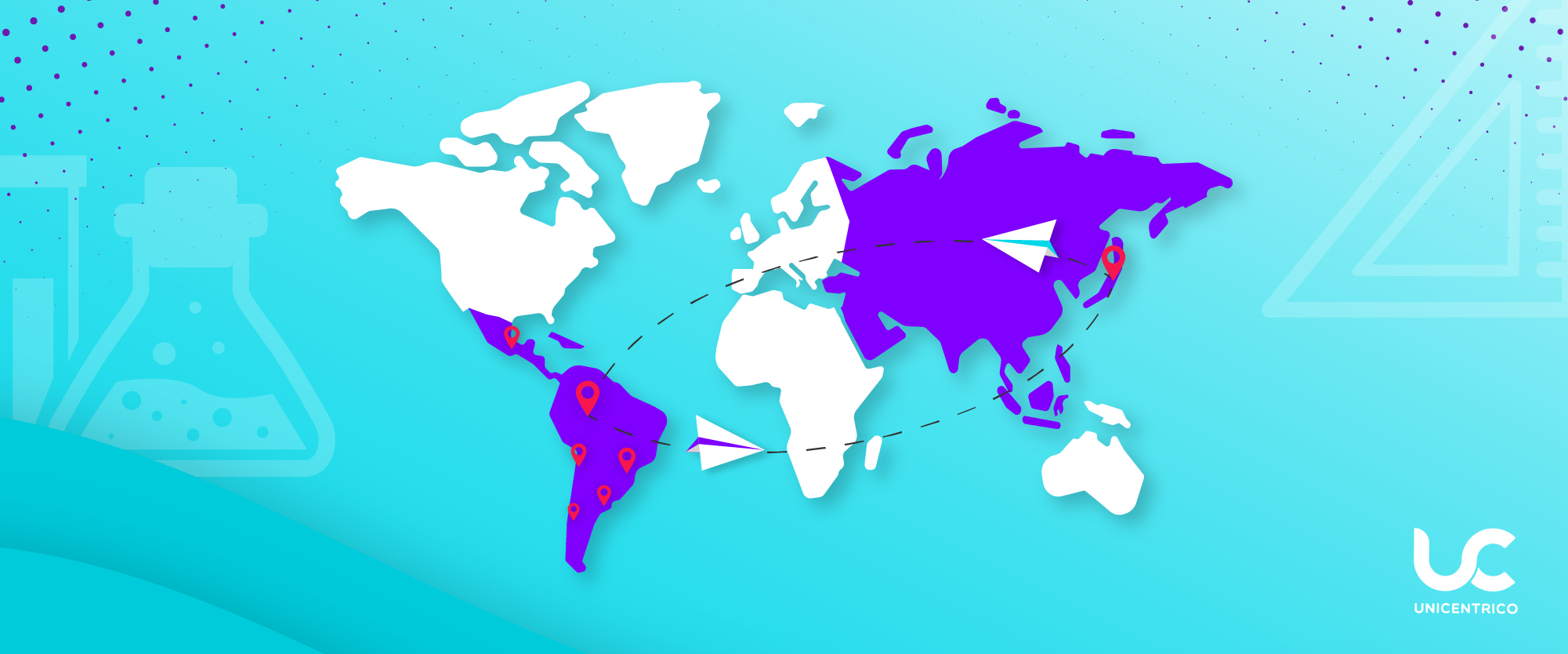We sat down with Rodrigo Queiroz and Giancarlo Carmelino, representatives of the Study in Japan team, and Mauricio Segura, CEO at Spiible - an Australian/Brazilian Education Service Platform to learn just how they were able to utilize technology to connect with students in Latin America and introduce Japan as an attractive destination to study abroad.
Jessica: So glad to talk to you all again after quite some time! I’d like to start with a quick overview of what is the Study in Japan project for all our readers.
Rodrigo: The Study in Japan project is a government-based project funded by the Ministry of Education, with the goal of making Japan more attractive for international students.
Our initial plan was to start promoting ourselves and our universities locally in different regions in Latin America and have representatives that can go to these target regions to promote this project. Of course, COVID changed everything and we had to completely change our scope of work and think more digital. This was a big worry for us at the time, but found it interesting and promising at the same time. In my case, I am the representative of the Brazil region for Japan and Giancarlo is the representative of Peru.
Giancarlo: The Study in Japan project is a governmental program, but it consists of different universities and each university has its own international offices that are looking to target different regions.
Rodrigo: Our roles are connecting all Japanese universities that are interested in becoming internationalized with students in Latin American. Since we cannot be physically there and we are not experts in the market yet, we needed support from local marketing agencies. That's where Spiible got involved in this project.
Mauricio: I'm the CEO & co-founder of Spiible. We're an Australian-based company. We were born as an ed-tech company with 23,000 courses for international students. Via our platform students can search and compare education online. We quickly became an online-offline company. We started growing a lot with our focus on transparency and trying to give more accessibility to international students, across the globe.
At the initial stages, we started recruiting students for universities, colleges, English courses, and so forth. We then got into migration and created a visa department dedicated to helping students through their visa process. We then decided to go on a global scale. We developed our educational fairs brand, called FIEE fairs, where we focus on developing fairs for universities, for ourselves, for focus on educational marketing recruitment, etc.
Therefore we also act as a marketing agency like yours Jessica, for education providers across the globe. We also work very closely with a few different governments such as the Japanese government, the Irish government, and the Australian government. We develop partnerships with local education providers to support their internationalization. It's a completely white label customizable solution that we offer to providers.

Jessica: [To the Study in Japan team] On a previous call, you mentioned that you already had a lot of students from Latin America that were going to Japanese universities before hiring Spiible. Do you think it's now even more attractive than it was before?
Rodrigo: Yes. Study in Japan has been operating for four years now, but we have always been strongly based in Brazil, in São Paulo, mainly because Brazil has the biggest Japanese descendant colony. From this year on, we are planning an expansion to Latin America. That's where Giancarlo comes in because Peru was going to be our starting point. I think we had an idea that the market was 50% Brazil and 50% all the other countries of Latin America together. But the response we got in Latin America was actually much more than in Brazil. It gives me the idea that Latin America is a great unexplored market.
Jessica: From our initial conversations, I remember we talked about the misconception that a lot of Latin American students and families have of Japan. Would you expand on some of these, please?
Giancarlo: Yes, the government actually runs a scholarship program where they offer full-ride scholarships for students in Latin America with Brazil being their main target. Some of the challenges we talked about with you Jessica were that Japan looked too much like a closed country for the region. Even with the marketing approach we had before COVID, our targeting was too local focusing only on Japanese ascended regions. I think that this re-strategy and “first step” to promote Japan communicated the message that Japan is open for everyone, and we let people know that Japan is not so distant and that students have many possibilities of studying and living there.
Rodrigo: Also, people have this conception that coming to Japan is very expensive compared to other regions such as North America or Europe, but actually the most expensive piece of the puzzle is probably your plane ticket.
Jessica: That is great! I should’ve studied in Japan! Let’s talk about the Latin American Fair. When we talked, you had less than three months to prepare for the event. How did that go?
Rodrigo: [laughs] Yes! I remember when we talked to you Jessica we were struggling to find the fastest and best way to execute this event successfully. Talking about preparation, we had a four-stage plan - honestly, we did not execute these four steps appropriately due to timing. The first step was establishing the audience, the look and feel of our page and our brand, and figuring out the key configurations of the event - What would the event be like? Who would we target, etc. Then we had a stage that was all about intense marketing that we should call the pre-event event stage. At this stage, we started to generate content for our audience. We worked on this stage for a whole month and executed webinars. The idea was to ramp and engage our audience with the days coming up to the event. We wanted to talk non-stop about Japan.
Jessica: How did you promote these small webinars to ramp people up?
Mauricio: I think it's a conglomerate of different initiatives that were all intertwined and interlinked to one main objective, which is the fair. We did a mix of paid advertisements, organic social media engagement, PR efforts, web-based promotion, influencer marketing, and worked with different partnerships (embassy partnerships, stakeholders related with the government, etc).

Jessica: What challenges did you encounter while launching this project?
Rodrigo: The main issue we had - which is actually a great problem to have - was that during the event we had a higher volume of attendees than we expected and the platform we were using did not support that high number of attendees. We did record the event, so we were able to distribute the event recording to people who were unable to join. However it was still frustrating for our students.
Giancarlo: Time difference was also a big challenge. It's 12 hours with Brazil but it's 16 with Peru, as well with Chile and Argentina.
Rodrigo: I’d also say that one of the biggest challenges was changing the mindset of our Japanese University representatives. They were a bit averse to this change and going digital. They are so structured to the point that it's hard to influence changes. After seeing the success of the event and the engagement of our audience in this region, they are starting to open up.
Jessica: That is great! I constantly see this resistance from higher education institutions in embracing digital recruiting methods and new technologies. I performed a market research report across Spanish-speaking Latin America and found that students depend more on online research rather than college fairs to inform their selection process. I think that due to COVID Universities are realizing this now and are seeing the power of these methods. What are the next steps now for the Study in Japan Team? What are your plans?
Rodrigo: We're having another event in March 2021. We're trying to keep this audience engaged. We have been sending surveys to get feedback from our registrants to see how we can improve. For example, some students got frustrated because they couldn't talk with universities because the event was so crowded. They want more chances to learn about the universities and to talk with representatives, which is great, right?
We also have to work into increasing the quality of our content, creating new things, and nurturing this audience.
Jessica: Mauricio, what were your thoughts when Rodrigo and Giancarlo came to you with this project idea?
Mauricio: My first thought was, “what a really beautiful challenge that they are presenting to us.” If you look at your top five, ten study destinations coming out of LATAM as a whole, Japan's not really there. Studying abroad is something unexplainable. The emotions that are involved with that are massive. It's a life-changing process. That's why I love my job as well as working in this industry. I think it's just fantastic. The impact that we have on lives is massive.
In a world where international student recruitment moves online, this team has proven that these online methods are and can be effective when done right. Education is important to students globally and they are willing to follow their dreams in both a digital and physical world. By using methodologies and strategies like social media marketing, paid promotion, and influencer engagement, Study in Japan was able to launch a successful virtual fair introducing Japan as an attractive destination to study abroad and reached thousands of Latin American students effectively. With limited time, resources, and little faith from their partnering universities, Spiible and Study in Japan have proven that even during a pandemic, high education and life exploration will always find a way.
What is UniCentrico by Centrico Digital?
UniCentrico is a Canadian-Ecuadorian recruiting service and platform that helps North American universities identify and connect with prospective students from Latin America. UniCentrico uses digital marketing to help universities identify and qualify prospective students. For more information, please contact Jessica Luna, Higher Education Marketing Head at jessica@centricodigital.com.

